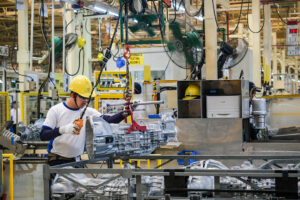By Justine Irish D. Tabile, Reporter
THE PHILIPPINE government is finalizing an incentive program that seeks to encourage car companies to boost manufacturing operations in the country, according to the Office of the Special Assistant to the President for Investment and Economic Affairs (OSAPIEA).
OSAPIEA chief Frederick D. Go said the government would soon introduce the Revitalizing the Automotive Industry for Competitiveness Enhancement (RACE) program.
“The previous administration came up with the Comprehensive Automotive Resurgence Strategy (CARS) program, and that’s already done, but we want to continue promoting the vehicle industry,” he told reporters on Monday.
Mr. Go said the RACE program would provide incentives to companies that will manufacture new car models in the country.
The program will be implemented by the Department of Trade and Industry (DTI), unlike CARS, which was established through an executive order.
“We designed RACE so that it is a department initiative,” Mr. Go said, noting that funds have been allotted for the program through the 2025 General Appropriations Act.
The RACE program has been allotted P250 million under the DTI’s budget for locally funded projects.
Created through Executive Order No. 182 by then President Benigno S. Aquino III, the CARS program aimed to attract new investments in the automotive industry.
It provided three slots for car manufacturers, which were required to produce at least 200,000 units of an enrolled model to avail themselves of the incentives.
However, only two slots were filled — Toyota Motor Philippines Corp. (TMP), which produces the Vios sedan, and Mitsubishi Motors Philippines Corp. (MMPC), which manufactures the Mirage hatchback and Mirage G4 sedan.
Mr. Go hinted the RACE program could accept more than three participants.
“We learned from CARS… The (RACE) program is slightly different, but the intent is the same, that if you introduce more local components into the vehicle, then you can qualify for the (incentives),” he added.
With the new program in the works, TMP and MMPC are again expected to register new models through RACE.
“We have expressed to DTI our intention to register the Next Generation Tamaraw as an additional CARS model if supported by regulation (CARS extension), particularly in considering reasonable flexibility for new production models,” TMP said in a statement.
“In case the DTI creates a new CARS-like program instead of ex- tending the existing program, we will gladly take that opportunity to make the Tamaraw even more sustainable for us automotive manufacturers, as well as our part makers and even body builders,” it added.
TMP recently invested P5.5 billion in its Laguna plant to ramp up vehicle production and in-house and outsourced parts localizations, as well as build a new conversion facility.
Meanwhile, Mitsubishi Motors Corp. (MMC), in a recent courtesy call to President Ferdinand R. Marcos, Jr., committed a P7-billion investment in the Philippines for the next five years.
The investment plan is said to include a new production model at its plant in Laguna, according to the Presidential Communications Office (PCO). The PCO said MMC would take part in the RACE program.
Meanwhile, the Philippine Parts Maker Association, Inc. (PPMA) urged the government to create a conducive environment for car manufacturing and assembly so the Philippines could keep up with its neighbors in the Association of Southeast Asian Nations (ASEAN) region.
“The time for action is now. Without immediate intervention… the Philippines risks falling further behind its ASEAN competitors,” the group said in a statement on Monday.
“The urgency to adapt and evolve in the automotive sector cannot be overstated. More decisive measures are essential to foster a sustainable and competitive automotive industry in the Philippines,” it added.
Data from the ASEAN Automotive Federation showed that the Philippines produced 116,650 motor vehicles in the first 11 months of 2024, ranking fifth in terms of production volume among six ASEAN countries.
Thailand produced the most cars, totaling 1.36 million in the January-to-November period, followed by Indonesia (885,516), Malaysia (725,173), and Vietnam (157,115).
“Our industry is in peril. We must urgently adopt measures to revitalize our auto parts manufacturing capabilities, or we will continue to fall behind our ASEAN neighbors,” said PPMA President Ferdinand I. Raquelsantos.
“The DTI has a critical role in this scenario, fostering initiatives that cannot only sustain but also enhance the automotive parts manufacturing sector is imperative,” he added.
Previously, the PPMA said the government could support the industry by mandating a 30% local content requirement for vehicles assembled in the Philippines and giving incentives such as income tax holidays and duty exemption on raw materials.
It also proposed tax credits for exports, accelerated depreciation for machinery and enhanced research and development deductions.
